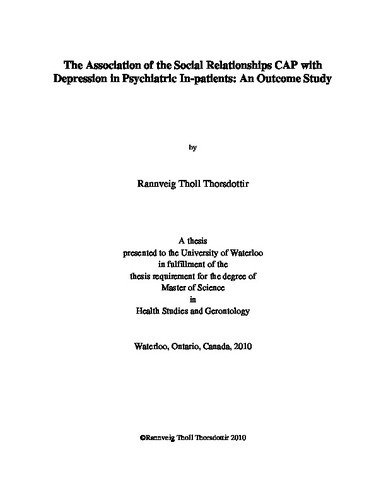| dc.description.abstract | Background: Depression is a worldwide problem but studies have shown that after patients with depressive symptoms are in remission, difficulties in social relationships may persist. There is a need for future research on the relationship between social function and depressive symptoms in order to facilitate development of new clinical interventions.
Objectives: This study aimed to identify what factors contribute to the relationship between depressive symptoms and social relationships and what factors predict improvement in depressive symptoms during psychiatric hospitalization.
Methods: This longitudinal cohort study was based on a secondary analysis of RAI-MH data from the Ontario Mental Health Reporting System (OMHRS). Depressive symptoms were measured with the Depressive Symptoms Rating Scale (DRS) and social relationships difficulties were evaluated with the interRAI Social Relationships CAP. The sample comprised of 125,120 patients from acute, long stay, addiction, psychiatric crisis units and forensic units. Sub-sample of patients with depressive symptoms and mood disorder was created (N = 38,823). Results presented in a descriptive analysis for both samples and bivariate and multivariate analysis for the sub-sample. Logistic regression analysis was performed to predict rates of improvement of depressive symptoms.
Results: The study revealed that many factors predict outcome of depressive symptoms. Difficulties in social relationships, older age, multi-morbidity, functional impairments, trauma, and poor physical health predict decreased odds of improvements but longer hospital stay, individual therapy and family/couples therapy predict increased odds of improvements. Conclusions: The interRAI Social Relationships CAP provides a valuable tool to address social issues in patient care, assist clinical staff in care planning and provide mental health authorities information for policy making. | en |

